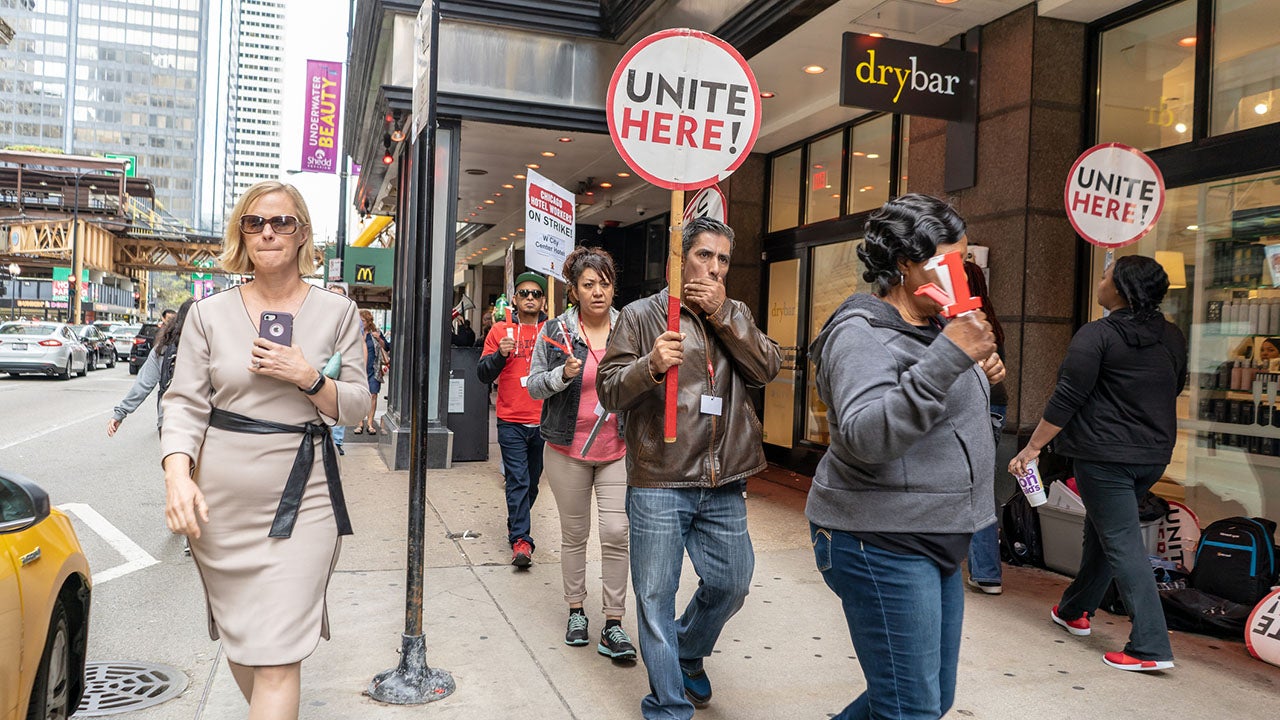Worker Power and the National Labor Relations Act
Description
Over the last year, media headlines have been filled with stories of workers from various industries on strike and attempting to unionize. The roots of these efforts lie with workers in the 1800s and early 1900s who first attempted to organize and used strikes to protest low wages and poor working conditions. Those early labor movements contributed to the passage of the National Labor Relations Act (NLRA) of 1935, which gave workers the right to organize into unions and made it the official policy of the U.S. to encourage collective bargaining. Union membership surged after the passage of the NLRA and peaked at 35 percent of wage and salary workers in 1954. The NRLA had less of an impact for women and people of color, however, whose main occupations in agricultural and domestic work were deliberately excluded from the law, exclusions that still negatively affect millions of workers today. The impact of NRLA in supporting collective bargaining has also waned over time. Today, only 10 percent of wage and salary workers belong to a union including 34 percent of public employees and six percent of workers in the private sector, very low compared to most OECD countries though unionization is declining globally as well.
The future of work and job quality rests in part on workers having agency and some ability to influence their work and workplace. The NLRA provides the legal foundation for workers’ right to exercise that agency. As we look to shape the future of work, what lessons can we learn from the NLRA’s history, impact and effectiveness today? This is the first conversation in our five-part series, The History and Future of U.S. Labor Law: Conversations to Shape the Future of Work.
Share
Tweet Video: Worker Power and the National Labor Relations Act. Featuring @SecMartyWalsh @USDOL, @roybahat @BloombergBeta, Jennifer Epps (The LIFT Fund), @AnneliseOrleck1 @dartmouth, and @charissejones @USATODAY. Hosted by @AspenJobQuality.
Tweet Headlines are filled with stories of strikes and union drives. How will the National Labor Relations Act and other factors affect these workers’ right to organize? Hear @AspenJobQuality and guests discuss labor law and the #futureofwork.
Tweet #JobQuality includes having a voice on the job. Union membership rose after the National Labor Relations Act passed in 1935, but declined significantly in the last few decades. What can it teach us for the #futureofwork?
Tweet The effects of the National Labor Relations Act waned over time and excluded many people from the beginning. As we shape the #futureofwork, what can we learn from its history and impact? Hear @AspenJobQuality and guests discuss.
Tweet In this video, hear @SecMartyWalsh, @roybahat, Jennifer Epps, @AnneliseOrleck1, and @charissejones #talkopportunity with @AspenJobQuality about Worker Power and the National Labor Relations Act.
Opening Remarks

The Honorable Marty Walsh @SecMartyWalsh
U.S. Secretary of Labor @USDOL
Martin J. Walsh was sworn in as the 29th Secretary of Labor on March 23, 2021. A lifelong champion of equity and fairness, and a proud product of the City of Boston, Secretary Walsh leads the U.S. Department of Labor with a strong connection to working people, and a commitment to creating an economy that works for all.
In 1997, he was elected to serve as a State Representative for one of the most diverse districts in Massachusetts. There, he focused on creating good jobs, protecting workers’ rights, expanding mental health treatment, and investing in public transit.
Following his time as a State Representative, Secretary Walsh spent the last seven years as the Mayor of the City of Boston. While mayor, he led the creation of close to 140,000 jobs and helped secure a statewide $15/hour minimum wage, paid sick leave, and paid parental leave. He established Universal, high-quality Pre-Kindergarten for all children, and free community college for low-income students.
Secretary Walsh was a national leader in the response to COVID-19, getting PPE to first responders and nursing homes; funding emergency child care for healthcare and frontline workers; halting evictions and providing rental relief; and setting up multiple funds to help small businesses survive. His work early in the pandemic to pause construction and establish safety requirements has been lauded as a model by both unions and employers alike.
As Mayor of Boston, Secretary Walsh also made his mark as a labor leader. After following his father into Laborers Local 223 in Boston, he rose to head the Building and Construction Trades Council from 2011 to 2013. He worked with business and community leaders to promote high-quality development, and he created a program called Building Pathways that has become a model for increasing diversity in the workplace and providing good career opportunities for women and people of color.
Born and raised in the neighborhood of Dorchester by immigrant parents, Secretary Walsh is driven to ensure our nation’s economy works for everyone. Secretary Walsh is a survivor of Burkitt lymphoma and is a proud member of the recovery community who has worked to expand addiction treatment throughout his career. While working full-time as a legislator, he returned to school to earn a degree in Political Science at Boston College.
Speakers

Roy Bahat @roybahat
Head of Bloomberg Beta @BloombergBeta
Roy Bahat is the head of Bloomberg Beta, an early-stage venture firm backed by Bloomberg L.P. that was the first venture capital fund to focus on both the future of work and artificial intelligence. He also serves on the faculty at UC Berkeley’s Haas School of Business.
Roy recently organized the Aspen Business Roundtable on Organized Labor. He was also a commissioner on California’s Future of Work Commission, following work he did with New America to understand the 10–20-year future of work and automation in America. He was named one of Fast Company’s Most Creative People in Business, has served in government, and led a nonprofit in addition to his work at established corporations and day zero startups.
He serves on the board or as an advisor to several nonprofits including the Stanford Center on Philanthropy and Civil Society and the Economic Security Project.
Roy graduated from Harvard College, where he ran the student public service nonprofit. He was a Rhodes Scholar at Oxford University.

Jennifer Epps
Executive Director, The LIFT Fund
Jennifer Epps is the new executive director of the LIFT Fund, which is the most innovative and progressive joint labor and philanthropic fund in the country. In this role, Epps leads the organization as its next leader in the fight to build a stronger worker and labor movement and support innovative and bold strategies being developed by organizers across America.
Epps brings to the LIFT Fund more than 15 years of experience as a seasoned organizer and strategic leader as well as extensive experience building worker power. After getting her start in community activism, Epps led new organizing campaigns in hospitals as vice president at 1199SEIU where she covered service and maintenance, technical, professional, and registered nurse units.
Her time with 1199SEIU prepared her for her leadership as the executive director of Prince George’s County Educators’ Association (PGCEA), one of the largest teacher’s unions in the country. While at PGCEA, Epps continued building on the Association’s rich history of racial justice work and community allyship.
She is a proud graduate of Howard University with proven expertise in implementing methodologies that achieve major victories in the labor movement. She lives just outside of the nation’s capital in Bowie, Maryland, with her husband and two daughters.

Dr. Annelise Orleck @AnneliseOrleck1
Professor of History, Dartmouth College @dartmouth
Annelise Orleck is a professor of history at Dartmouth College. She is the author of five books and co-editor of two. Among these are “Common Sense and a Little Fire: Women and Working Class Politics in the United States,” “Soviet Jewish Americans,” “Storming Caesars’ Palace: How Black Mothers Fought Their Own War on Poverty,” “Rethinking American Women’s Activism,” and “We are All Fast Food Workers Now: The Global Uprising Against Poverty Wages.” She is co-editor of “The Politics of Motherhood: Activist Voices from Left to Right” and “The War on Poverty, 1964-1980: A New Grassroots History.” Her writing has appeared in Salon, The Guardian, Mother Jones, The Progressive, Bitch Media, The Conversation, TalkPoverty, and more.
Moderator

Charisse Jones @charissejones
Economic Opportunity Reporter, USA Today @USATODAY
Charisse Jones is an economic opportunity correspondent for USA TODAY focusing on income inequality, economic access, and the ways the workplace is changing amid the COVID-19 pandemic. She was previously a staff writer for the New York Times and part of a Pulitzer Prize-winning team at the Los Angeles Times. In addition to being a veteran reporter, Jones is the author of several books, including the American Book Award-winning “Shifting: The Double Lives of Black Women in America’’ and the Misty Copeland memoir “Life in Motion,’’ a New York Times bestseller. She is a frequent contributor to CBS Mornings and has lectured on gender politics and race at the Harvard and Yale Clubs of New York City, the University of Georgia, and numerous other institutions.
The History and Future of U.S. Labor Law: Conversations to Shape the Future of Work
U.S. labor laws passed in the last 100 years improved job quality for millions of workers, establishing and enhancing bargaining rights, wages, opportunities, and workplace safety while also helping to create the world’s largest economy and middle class. These laws did not redound to the benefit of all workers and too often excluded women, people of color and immigrants from their protections. In many ways, these laws were the codification of a social contract across class in the U.S., creating the conditions for economic progress with a mostly common purpose. Today, however, the power of these laws has eroded and the rights they once afforded workers–to have a voice in the workplace, to be safe from harm, to access opportunity regardless of social status, to earn a decent living–have diminished. As a result, millions of workers in the U.S. today find themselves immersed in the fight, like many workers before them, to access opportunity and improve job quality for themselves and future generations.
The future of work will be shaped by what we do now, just as the labor laws passed long ago have influenced opportunity, employment and workplaces today. Understanding our past is, therefore, vital to charting the course for what we want work and job quality to look like tomorrow and decades from now. Join The Aspen Institute Economic Opportunities Program for this five-part discussion series, The History and Future of U.S. Labor Law: Conversations to Shape the Future of Work, where we will learn about and reflect on the history of U.S. labor law, examine current implications and challenges, and discuss how we shape a future of work that provides opportunity and dignity to all.
- Part I: Worker Power and the National Labor Relations Act – March 16
- Part II: The Rewards of Work: Lessons from the Fair Labor Standards Act – April 7
- Part III: Title VII of the Civil Rights Act: Fulfilling the Promise of Equal Opportunity – April 27
- Part IV: The Occupational Safety and Health Act: The Past and Future of Workers’ Well-Being – May 4
- Part V: A Workers’ Bill of Rights: What We Want and How to Get There – May 26
Opportunity in America
The Economic Opportunities Program’s Opportunity in America discussion series has moved to an all-virtual format as we all do what we can to slow the spread of COVID-19. But the conversations about the changing landscape of economic opportunity in the US and implications for individuals, families, and communities across the country remain vitally important. We hope you will participate as we bring our discussions to you in virtual formats, and we look forward to your feedback.
We are grateful to Prudential Financial, Walmart, the Surdna Foundation, the W. K. Kellogg Foundation, Bloomberg, and the Mastercard Center for Inclusive Growth for their support of this series.
Learn More
The Economic Opportunities Program advances strategies, policies, and ideas to help low- and moderate-income people thrive in a changing economy. Follow us on social media and join our mailing list to stay up-to-date on publications, blog posts, events, and other announcements.
